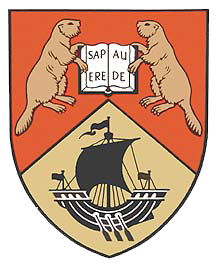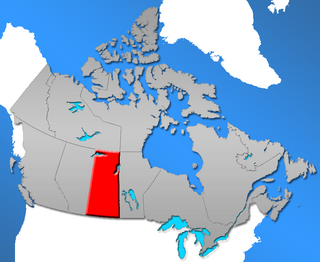
Crandall University is a Baptist Christian liberal arts university located in Moncton, New Brunswick, Canada. It is affiliated with the Canadian Baptists of Atlantic Canada.

Saint John is a seaport city located on the Bay of Fundy in the province of New Brunswick, Canada. It is Canada's oldest incorporated city, established by royal charter on May 18, 1785, during the reign of George III. The port is Canada's third-largest by tonnage with a cargo base that includes dry and liquid bulk, break bulk, containers, and cruise. The city was the most populous in New Brunswick until the 2016 census, when it was overtaken by Moncton. It is currently the second-largest city in the province, with a population of 69,895 over an area of 315.59 km2 (121.85 sq mi).

The University of New Brunswick (UNB) is a public university with two primary campuses in Fredericton and Saint John, New Brunswick. It is the oldest English-language university in Canada, and among the oldest public universities in North America. UNB was founded by a group of seven Loyalists who left the United States after the American Revolution.

Mount Allison University is a Canadian primarily undergraduate liberal arts university located in Sackville, New Brunswick, founded in 1839.

The American Association of University Professors (AAUP) is an organization of professors and other academics in the United States. AAUP membership includes over 500 local campus chapters and 39 state organizations.
The St. Thomas University Students' Union (STUSU) represents students at St. Thomas University (STU) in Fredericton, New Brunswick, Canada. They provide many services to students at STU, such as the Help Desk, SafeRide, pre-legal advice, emergency bursaries and external lobbying. They also lead negotiations on such initiatives as the Student Health and Dental Plans, and a Universal Bus Pass.

The Brunswickan is the official student newspaper of the Fredericton campus of the University of New Brunswick, New Brunswick, Canada. Founded in 1867, it has a circulation of 4,000 and issues are published on the first Wednesday each month, traditionally running 8 issues annually.
The University of New Brunswick Faculty of Law is the second oldest university-based common law Faculty in the Commonwealth. It is located in New Brunswick's capital city, Fredericton, and is one of two law schools located in the province, the other being the French-language Faculty at l'Université de Moncton.
The Acadia University Faculty Association was certified on July 15, 1976, and is the trade union representing the full-time and part-time professors, instructors, and academic librarians and archivists at Acadia University in Nova Scotia. AUFA members have taken strike action three times in their history: in the spring of 2004 and the fall of 2007, during the presidency of Gail Dinter-Gottlieb; and in February 2022 during the presidency of Peter Ricketts. AUFA is a member of the Canadian Association of University Teachers (CAUT).

Higher education in Canada includes provincial, territorial, Indigenous and military higher education systems. The ideal objective of Canadian higher education is to offer every Canadian the opportunity to acquire the skills and knowledge necessary to realize their utmost potential. It aspires to cultivate a world-class workforce, enhance the employment rate of Canadians, and safeguard Canada's enduring prosperity. Higher education programs are intricately designed with the perspective of the learner in focus, striving to mitigate risks and assure definite outcomes.

Historically, Saskatchewan's higher education system has been "significantly shaped" by demographics. In 1901, six years prior to the 1907 founding of a university in Saskatchewan, the urban population in Saskatchewan was 14,266 (16%) while the rural population was 77,013 (84%). One hundred years later, the proportions had changed significantly: urban population in 2001 was 629,036 (64%) while the rural population was 349,897 (36%). Over time the province's higher education system has changed significantly in response both to this demographic shift and to provincial politics.

Higher education in New Brunswick refers to education provided by higher education institutions in the Canadian province of New Brunswick. Higher education has a rich history in New Brunswick. The first English-language university in Canada was the University of New Brunswick. Mount Allison University was the first in the British Empire to award a baccalaureate to a woman, Grace Annie Lockhart, B.Sc. in 1875. Education is the responsibility of the provinces in Canada and there is no federal ministry governing it.
The Canadian Association of University Teachers is a federation of independent associations and trade unions representing approximately 70,000 teachers, librarians, researchers, and other academic professionals and general staff at 120 universities and colleges across Canada.
The Federation of New Brunswick Faculty Associations (FNBFA) is the voice of university faculty and academic librarians across the province of New Brunswick, Canada. They seek to advance their members’ professional interests and to improve the quality of the education system. The FNBFA represents 1,800 regular and contract academics through its six member associations.

Eddy Campbell is a Canadian mathematician, university professor, and university administrator. He served as the president of the University of New Brunswick from 2009 - 2019.
Harry Sherman Crowe (1922–1981) was a history professor, university administrator, and labour researcher. In 1958, his firing by United College gained national attention in Canada. In raising questions about the security of academic freedom and tenure in Canada, Crowe's case became a catalyst in solidifying the work of the Canadian Association of University Teachers (CAUT) in defending academic freedom and ensuring scholarly rights for academic staff in Canada.
James Leonard Turk is a Canadian academic and Director of the Centre for Free Expression at Toronto Metropolitan University. He is a frequent media commentator and public speaker on freedom of expression, intellectual freedom, post-secondary education, academic freedom, whistleblowing, and other public policy issues related to expressive freedom, social justice, and democracy.

The 2018 York University strike was a strike by CUPE Local 3903, the union representing contract professors, teaching assistants, and graduate assistants at York University. At 143 days long it is the longest strike in the post-secondary sector in Canadian history, surpassing the previous record of the 1976 Laval University 108-day strike. It ended on July 25, when the Ontario Legislature passed the Urgent Priorities Act back-to-work legislation.

The Strax affair was a sequence of events at the University of New Brunswick (UNB) in Fredericton in 1968 and 1969. It began in September 1968 when the university president suspended Norman Strax, a young physics professor, after Strax led protests in the university library against the introduction of photo ID cards. The suspension, and UNB's subsequent legal proceedings against Strax, led to the institution's being censured by the Canadian Association of University Teachers (CAUT). Other components of the affair were the lengthy occupation of Strax's former office by his supporters and the jailing of a student for an article that appeared in the student newspaper questioning the objectivity of the New Brunswick legal system. The formal lifting of the CAUT censure in September 1969 brought the Strax affair to an end.












